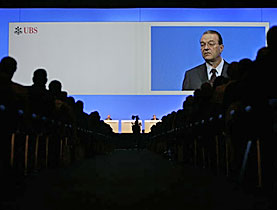
Where does UBS go from here?

The new management team at UBS painted a bleak picture of the bank's fortunes at its annual general meeting, but promised to find solutions.
The world’s largest wealth manager on Wednesday announced huge job cuts and forecast yet more financial losses for the first quarter. But one expert believes UBS will turn the corner as a leaner, more focused operation.
Chief Executive Oswald Grübel, who joined the bank in February, said UBS would in future channel its energies to wealth management and closer to home – a marked departure from the investment banking focus that got it into trouble.
“In short, the UBS of the future will be a global bank whose core business is international wealth management, with a particular focus on its domestic banking business,” he said.
The dire forecast disappointed many analysts despite news that the bank would be cutting costs with staff reductions of 8,700 worldwide.
“A cautious outlook for revenue growth leads us to suspect it may be accompanied by revenues below current expectations,” Keefe, Bruyette & Woods analyst Matthew Clarke said in a note.
Fighting chance
But Hans Geiger, a former professor at Zurich University’s Swiss Institute for Banking and Finance, thought that UBS had a fighting chance to turn things around. And he was surprised that the projected SFr2 billion ($1.75 billion) first quarter loss was not higher.
“Grübel was cautious in his speech, even too pessimistic in order to reduce expectations. I think the bank could do better than that,” Geiger told swissinfo. “They will come out of this a very much smaller bank, more focused on wealth management and with a nicer attitude.”
Geiger added that he had faith in the new management team of Grübel and chairman Kaspar Villiger, who was elected to the role by shareholders on Wednesday.
“This is a turning point because the two people at the top have nothing to do with the past. I know many good bankers who are lousy managers or good managers who have no understanding for the market, but Grübel combines the two,” Geiger said.
Geiger believes UBS has now seen off the worst of the subprime crisis shocks as a result of the Swiss National Bank last year injecting funds into the bank and absorbing its toxic assets.
US threat
But the biggest threat to UBS’s revival, according to Geiger, is the damage caused to the bank’s reputation over the United States tax evasion investigation, in which it is accused of helping wealthy Americans dodge taxes.
UBS was forced to hand over confidential client data to settle the case, a move that could damage its wealth management business.
The bank must now to restore confidence after seeing net outflows of $58 billion (SFr67 billion) the last quarter of 2008. Wealthy clients also withdrew a net SFr23 billion in the first quarter of this year after UBS settled with the US authorities.
“UBS has mistreated their clients, and that was at least as harmful as the subprime losses. I don’t think confidence and trust will return so easily,” Geiger said.
All eyes will be on UBS’s financial reporting at the end of the year to see if the bank can live up to its promise to return to profitability in 2009. But few observers expect UBS, with its cautious approach, to emulate US investment bank Goldman Sachs that posted bumper $1.8 billion first quarter net income earlier this month.
swissinfo, Matthew Allen in Zurich
UBS’s fall from grace as one of the most respected and solid global banks has been dramatic in the last two years. It now faces an uphill battle to restore profits and reputation after becoming the worst European victim of the subprime crisis.
The problems started to become apparent in July 2007, when chief executive Peter Wuffli stepped down following the collapse of the bank’s hedge fund Dillon Read Capital Management.
In October 2007, UBS said it would cut 1,500 jobs in its investment banking arm and axed two leading executives. Chairman Marcel Ospel stepped down in April 2008.
In October last year, the Swiss National Bank (SNB) was forced to inject SFr6 billion ($5.29 billion) into UBS. A facility was also set up to allow the bank to bin up to $60 billion of toxic assets.
This bailout did not prevent the bank from posting a SFr20 billion loss for 2008. Wealthy clients pulled out $58 billion from the bank in the last quarter alone.
UBS has also been haunted by a US investigation that accused the bank of helping wealthy Americans illegally evade $200 billion in taxes. It was forced to pay $780 million in fines and hand over some confidential client data.
In February, former Credit Suisse Chief Executive Oswald Grübel took over the same position at UBS, replacing Marcel Rohner.

In compliance with the JTI standards
More: SWI swissinfo.ch certified by the Journalism Trust Initiative
































You can find an overview of ongoing debates with our journalists here . Please join us!
If you want to start a conversation about a topic raised in this article or want to report factual errors, email us at english@swissinfo.ch.